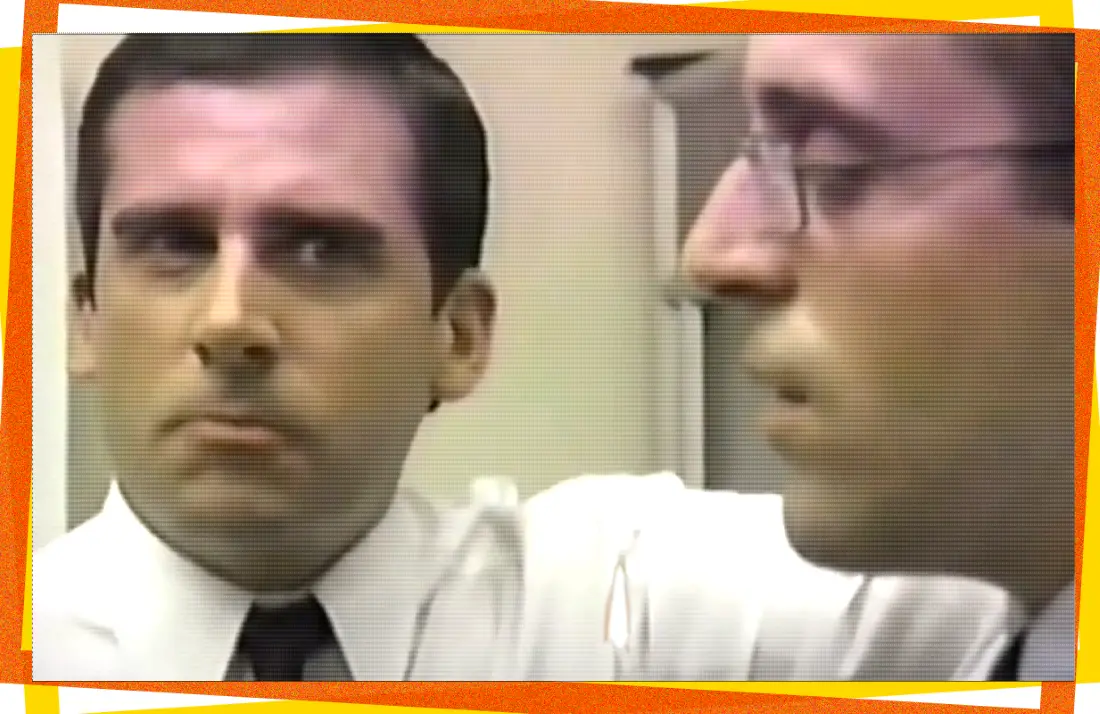Lost 2001 FedEx Commercials Star Steve Carell as an Existential Michael Scott
-
 Steve Carell talks earnestly about FedEx.
Steve Carell talks earnestly about FedEx.Following his Oscar-nominated work in Foxcatcher and his dramatic turns in The Morning Show and the new FX series The Patient, Steve Carell is now a bona fide Serious Actor. Before that, of course, he was a comedy A-lister thanks to The Office and the time he screamed out Kelly Clarkson's name.
But before all that, Carell took a detour into the surreal angst of existentialism via a series of FedEx commercials that first aired in 2001.
Thanks to the setting, Carell himself, and a pre-fame background appearance from Ed Helms in one of the spots, the commercials might seem like a warm-up for The Office, but if these ads do resemble a sitcom, then it's one created by Samuel Beckett. Their rapid-fire language and constant motion make us laugh, but that's just a distraction from all the spiritual emptiness.
The set-up is always the same: Carell and his buddy (played by Joe Narciso) are in the midst of something. They might be eating at a restaurant, waiting for a cab, sitting in an empty office, or walking up an endless set of stairs, but no matter what, they're in-between, moving through spaces designed for people who won't be staying long.
Now, one could argue this is a good parallel for FedEx itself, since the company is built to get things from one place to another. You could say that by putting its guys in various liminal states, the commercials reinforce how FedEx has mastered this realm. But one could also say the ads are constructed to remind us that most of life is spent being nowhere at all.
The blankness of living also drives the conversation. In each spot, Carell is a wiseacre who's trying to explain how FedEx triumphed over some kind of shipping dilemma. Narciso is his dreamy foil: Instead of focusing on the glories of FedEx, he fixates on some quirky detail in Carell's story, like whether or not people bowl in Italy. Carell is annoyed by the interruptions, but they never keep him from returning to his package-based obsession.
This is a classic comedy premise. We've been laughing forever at high-strung people who get frustrated by their blissed-out pals. The difference is that in the FedEx spots, the guys' funny relationship papers over how meaningless their lives are.
To wit, there are at least half a dozen of these commercials, and we never know what these fellows actually do. They enact the routines of people with jobs, but they have no real work. And despite all the time they spend together, they never listen to each other. The doofus never wises up, and the fast-talker never notices that his stories aren't getting through. They're forever trapped in the cycle.
Plus, Carell's character only ever talks about FedEx. Is there anything more depressing than someone who fixates on the exploits of a shipping company? Cumulatively, if unintentionally, the ads make a damning point about how much of our lives we waste going to and fro, talking past each other and focusing on trivial things.
No matter how much their ads make us giggle, FedEx can't deliver us from this void. Perhaps Steve Carell knows someone who can help.
Mark Blankenship has been writing about arts and culture for twenty years, with bylines in The New York Times, Variety, Vulture, Fortune, and many others. You can hear him on the pop music podcast Mark and Sarah Talk About Songs.
TOPICS: Steve Carell, The Patient, Aasif Mandvi, Ed Helms, Eric Stonestreet, Joe Narciso, commercials